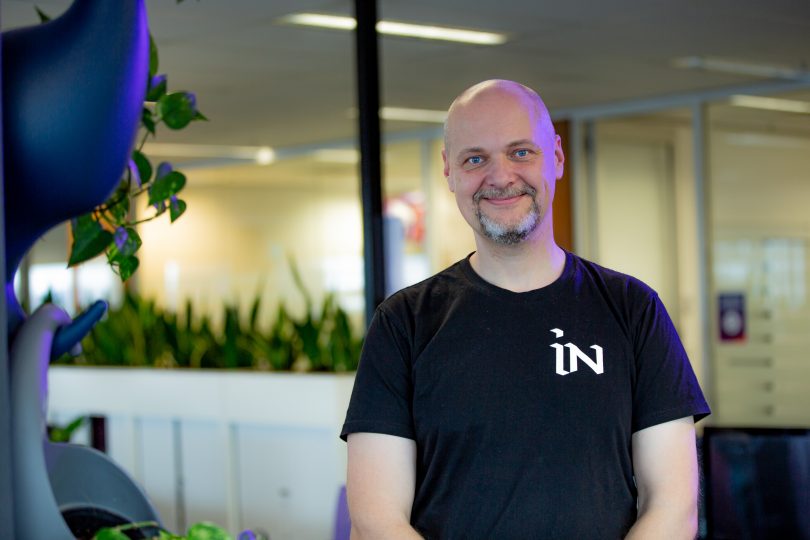
Canberra Innovation Network chief executive officer Petr Adámek. Photo: Region Media.
Never let a good crisis go to waste, so the saying goes. First credited to Winston Churchill during WWII, Canberra Innovation Network chief executive officer Petr Adámek says the saying still applies today as businesses look to find opportunity in a disrupted market.
“The disruption of COVID-19 can provide a catalyst for innovation for clever entrepreneurs and established businesses alike,” he says.
“This crisis is all about changing behaviours. The way people consume goods and services has changed, giving businesses opportunities to implement changes that were difficult before, but may be easier now.
“Think about changes you can make. Imagine there is no status quo and this is moment zero. If you had the opportunity for a new audience, how would you choose to run your business?
“Look for opportunity. Businesses now have permission to innovate.
“In the past, you may have felt obliged to meet customers’ expectations as you had a consistent revenue stream, but that is shaken now. Look at your competition and get inspiration from others. The biggest space for opportunity right now is that consumer behaviour has changed and it may never come back to what we knew before.”
Petr says the best place to start is to think about any way to increase the uptake of digital services and connect with people in your industry.
Canberra Innovation Network – empowering local entrepreneurs
Canberra Innovation Network helps locals with big ideas transform their vision into reality. Genevieve Jacobs is with dynamic business builders Kieran Lawton and Kate Freeman – Nutritionist to hear about how the CBRIN helped them grow a viable, thriving business.
Posted by The RiotACT on Thursday, August 27, 2020
Canberra’s SignOnSite is an example of a business that has benefited from being digitally ready. SignOnSite is a contactless application designed for signing on workers to building sites to record attendance, conduct inductions and deliver communications to workers. A smart recognition of dual purpose has seen the company significantly increase it’s sales.
“Our application was ready to double for use as a COVID-19 contact tracing app,” says SignOnSite chief executive officer Mitch Harmer. “The word spread and we picked up heaps of sales from site-based businesses that had not switched to digital, but now needed a way to record site workers and visitors to comply with their COVID-19 safety plan.”
Petr says shocks are good in many way.
“If we think about history and what it teaches us about when things were hard, some of the greatest innovations have happened in a pressure environment,” he says.
“Many businesses have had to reduce staffing levels due to a significant fall in revenue. That is not easy, but if you can turn and work on your staff productivity this may be an opportunity to be reborn as a company. You may even need new skills in your team.
Skoolbo is another example of a locally based business that found an opportunity in the digitisation of customers. As an online full curriculum learning program for four to 10-year-olds, Skoolbo was faced with a unique change in its customer needs that money could not have bought.
“The shift to remote learning created all sorts of issues for home and schools, and our business was uniquely placed to help,” says Skoolbo founder Shane Hill. “The requirement for home learning created a genuine crisis.
“Thank goodness tech has been able to fill the void. If this crisis had occurred 15-20 years ago, it would have been a lot worse. Teachers would be photocopying and mailing out packages to students at home.
“The launch of our new product, Writing Legends, coincided with [COVID-19] shutdown and we decided to make access for teachers free until July. We had 10,000 teachers sign on in three weeks. We met an enormous need.
A significant move that paid dividends for Skoolbo was a partnership with a business that had effectively lost it’s market during the crisis. Flexischools is an online ordering and payment program usually applied to canteens and excursions.
“They had 500,000 parents and no-one needing school lunches,” says Shane.
The partnership between Skoolbo and Flexischools instantly gave Skoolbo access to a wider audience. For Flexischools, it meant a continuation of business.
But Shane says it is not all about profit.
“Those of us in the ed-tech space are passionate about helping,” he explains. “We looked at this situation from a perspective of ‘how can we assist’ and responded from there.”
The response included reducing the licence fee from $120 to $20, and offering 50,000 free licences to schools for families in particular need.
“While we gained a lot of business from this crisis, we also had a unique opportunity to assist many children and families who were in danger of being left behind,” says Shane. “That is a good outcome all round.”
For more information about how to turn an impossible idea into the possible, visit the Canberra Innovation Network.
Original Article published by Karyn Starmer on The RiotACT.


What's Your Opinion?